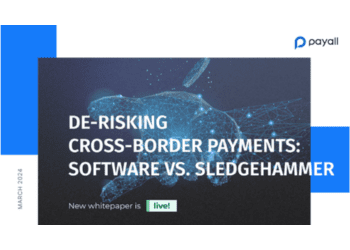Payall, the first-ever provider of an end-to-end banking infrastructure for cross-border payments, published a provocative and fresh report from notable banking and technology researcher and writer Jonathan Tyce that estimates banks and other financial services providers could cut cross-border transaction costs by 50% and reduce compliance violations by as much as 90% with new software and paradigms.
The whitepaper, “De-Risking Cross-Border Payments: Software vs. Sledgehammer,” examines why many banks and other financial institutions have exited, are leaving, or are unable to enter the cross-border payments market because of compliance and other risks as well as escalating costs and offers a pathway to challenge the status quo.
As demand for international transactions grows exponentially—cross-border payments are expected to reach $160 trillion this year and could reach $250 trillion by 2030—the need for safe, fast, fairly priced and transparent international money transfers has never been more critical. The whitepaper, authored by Jonathan Tyce, director at Kenaz LTD, spotlights the unintended consequences of de-risking, challenges of staying in the market and the substantial benefits technology can bring to cross-border payments.
“It’s mind-blowing (and quite scary) that after 50 years, financial institutions and others in the cross-border ecosystem are executing millions of manual processes each day at originating institutions, intermediate and correspondent banks to process an international money transfer,” said Gary Palmer, President and CEO at Payall Payment Systems, Inc.“Purpose-built software or proper digital infrastructure for the cross-border ecosystem IS the solution. From directly addressing what have been intractable problems to enabling breakthrough transparency for all stakeholders, including regulators, the future of cross-border payments is now.”
Key Findings: Combatting unintended consequences, increasing competition and consumer access
The paper suggests that de-risking is not only a threat to the financial institutions shut out of this potentially lucrative market. It’s also a threat to competition, innovation and access for millions of consumers worldwide, often those who need it most.
However, with bank adoption of automation tools that increase visibility, eliminate manual errors and improve security – regulators and risk managers can avoid these unintended consequences. With insights from a long-time correspondent banker and a former senior advisor and financial crimes expert with the U.S. Treasury and the private sector, the whitepaper reveals:
For more on how financial institutions can reclaim their rightful position in this massive and growing market, download the full whitepaper at https://payall.com/
Contact us at: https://payall.com/contact-us

The Payments Association
St Clement’s House
27 Clements Lane
London EC4N 7AE
© Copyright 2024 The Payments Association. All Rights Reserved. The Payments Association is the trading name of Emerging Payments Ventures Limited.
Emerging Ventures Limited t/a The Payments Association; Registered in England and Wales, Company Number 06672728; VAT no. 938829859; Registered office address St. Clement’s House, 27 Clements Lane, London, England, EC4N 7AE.







Log in to access complimentary passes or discounts and access exclusive content as part of your membership. An auto-login link will be sent directly to your email.
We use an auto-login link to ensure optimum security for your members hub. Simply enter your professional work e-mail address into the input area and you’ll receive a link to directly access your account.
Instead of using passwords, we e-mail you a link to log in to the site. This allows us to automatically verify you and apply member benefits based on your e-mail domain name.
Please click the button below which relates to the issue you’re having.
Sometimes our e-mails end up in spam. Make sure to check your spam folder for e-mails from The Payments Association
Most modern e-mail clients now separate e-mails into different tabs. For example, Outlook has an “Other” tab, and Gmail has tabs for different types of e-mails, such as promotional.
For security reasons the link will expire after 60 minutes. Try submitting the login form again and wait a few seconds for the e-mail to arrive.
The link will only work one time – once it’s been clicked, the link won’t log you in again. Instead, you’ll need to go back to the login screen and generate a new link.
Make sure you’re clicking the link on the most recent e-mail that’s been sent to you. We recommend deleting the e-mail once you’ve clicked the link.
Some security systems will automatically click on links in e-mails to check for phishing, malware, viruses and other malicious threats. If these have been clicked, it won’t work when you try to click on the link.
For security reasons, e-mail address changes can only be complete by your Member Engagement Manager. Please contact the team directly for further help.